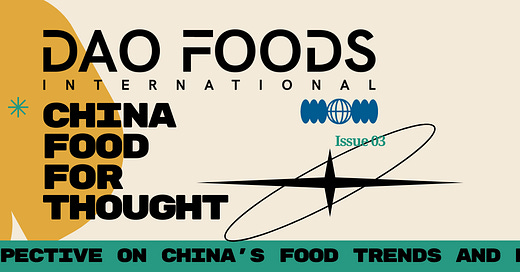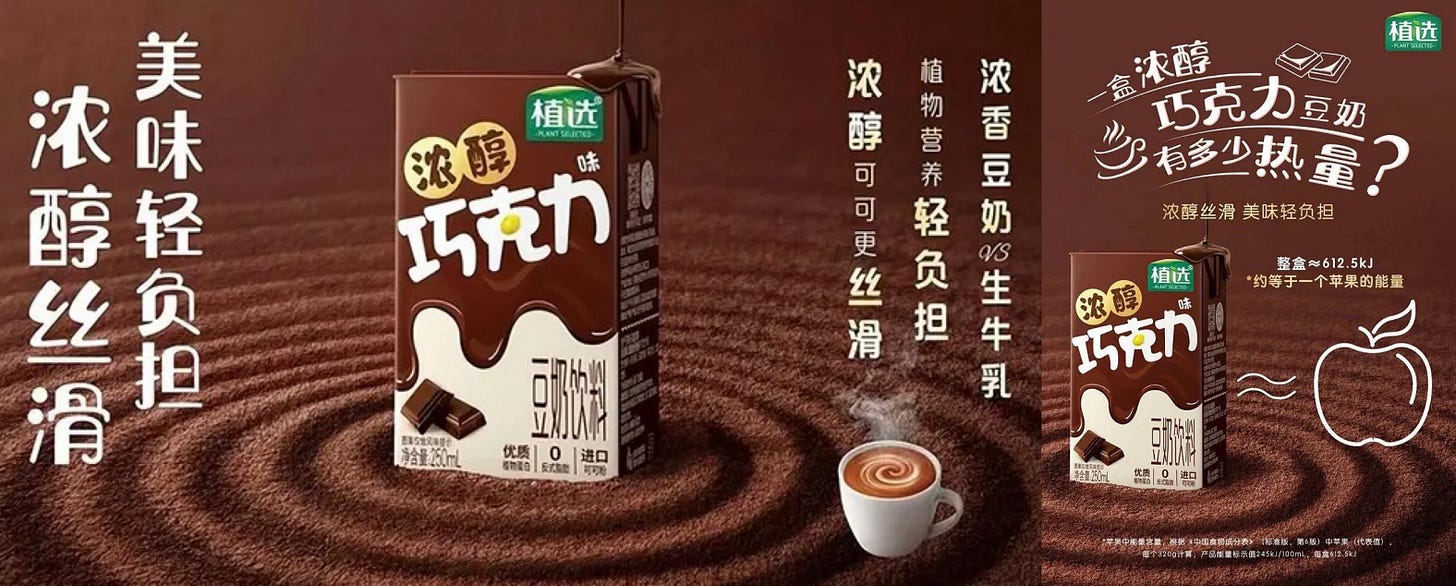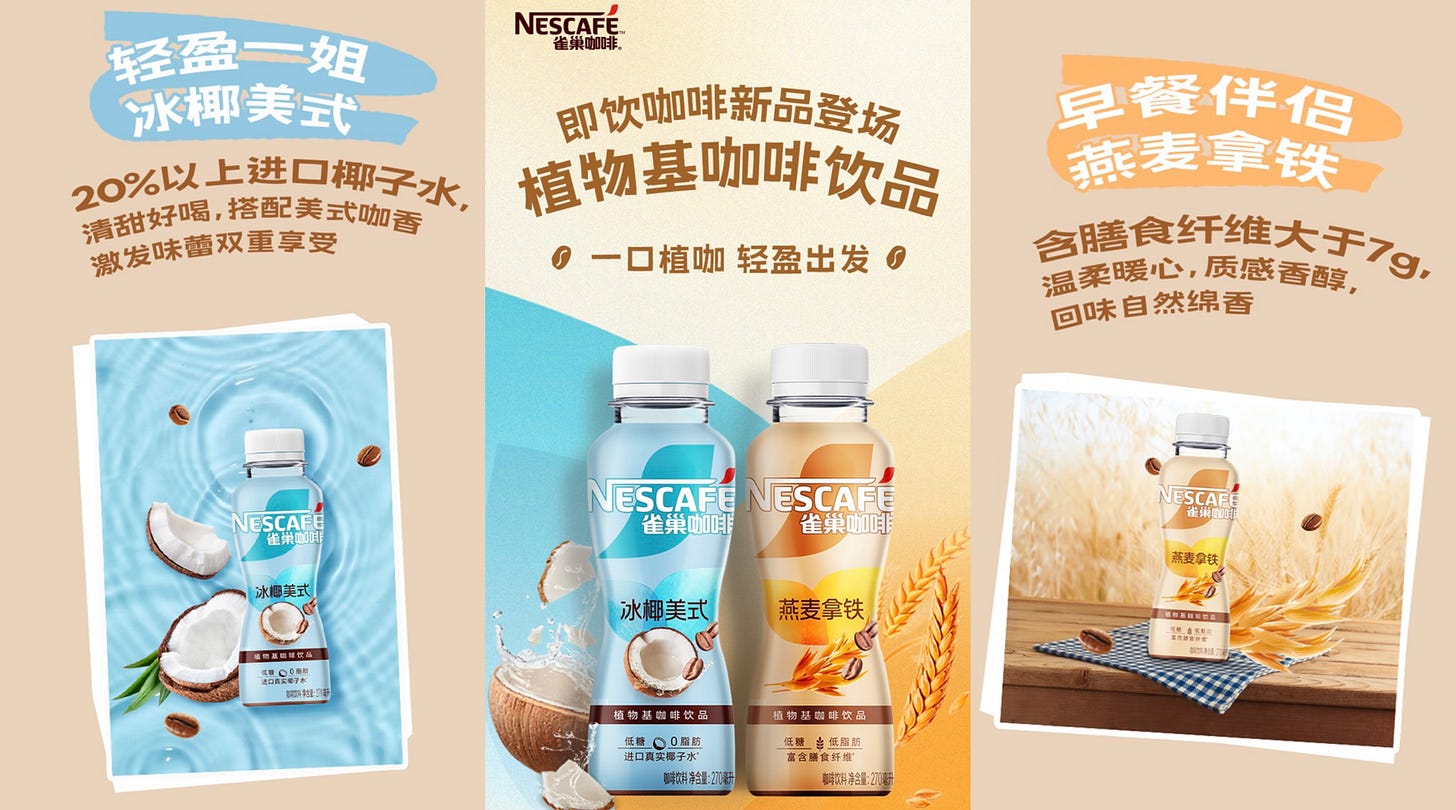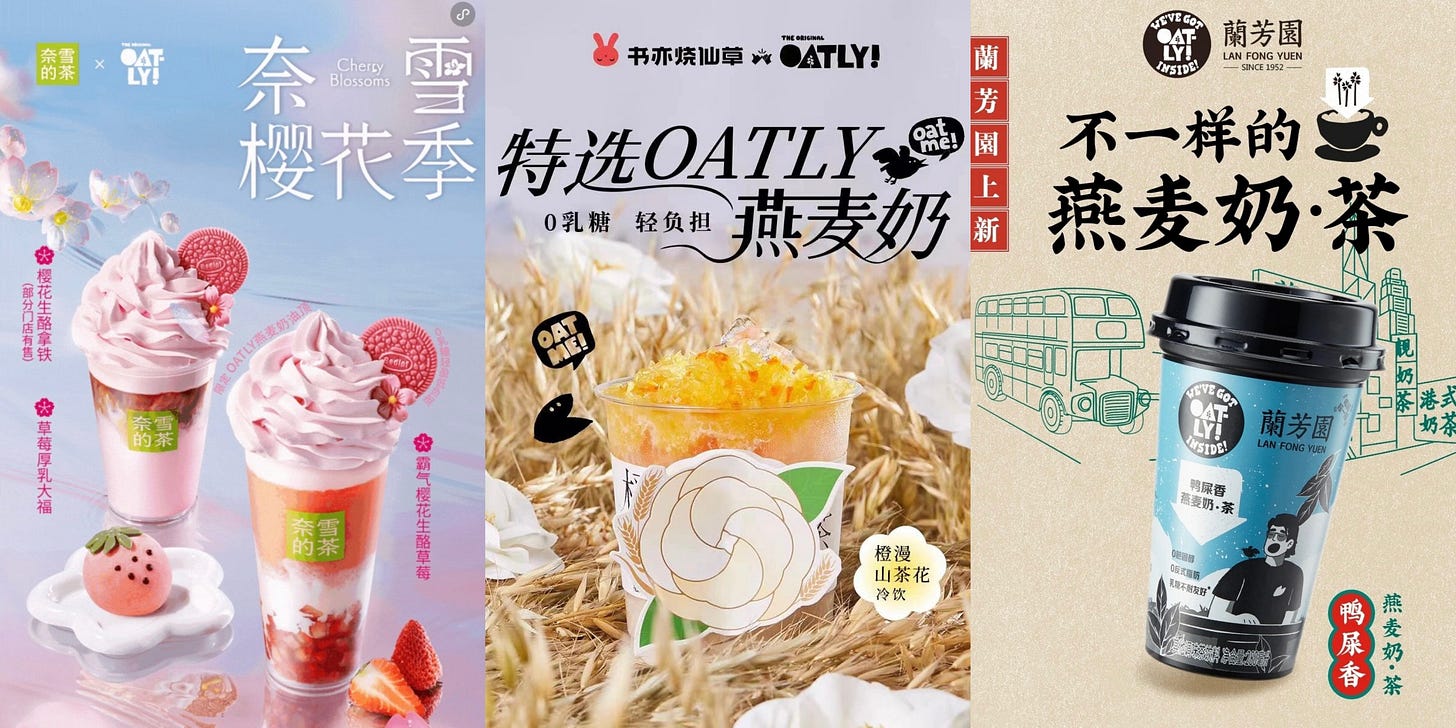Dao Foods views China as the world's most important protein and food market from both a climate impact and business opportunity perspective. Our new series China Food for Thought delves into the rapidly evolving alternative protein sector in China, and the broader market trends within the food industry. We selectively curate and share industry news from China with international audiences that may lack easy access to news and trends in China. Our goal is to provide readers with a ground-up view of valuable industry content from the Dao Foods perspective.
1. Plant Selected Unveils Newest Low-Calorie and Low-Sugar Chocolate Soy Milk
In March 2024, Plant Selected introduced its newest product: Chocolate Soy Milk. As a sub-brand of Yili, a leading dairy company in China, Plant Selected has concentrated on the plant-based sector since 2017. Their new Chocolate Soy Milk skillfully combines soy milk with cocoa powder. Each serving contains approximately the same amount of calories as an apple, offering a guilt-free choice for health-conscious consumers.
Plant Selected is the first plant-based milk in China to receive the Bureau Veritas carbon footprint verification. With a carbon footprint of only 0.19 kg CO2 per package, Plant Selected soy milk's emissions are equivalent to using just 0.3 kWh of electricity.
To distinguish itself from other soy milk products, Plant Selected continuously improves its taste, reduces beaniness, and offers a generous serving of high-quality plant protein. Each 250ml box contains 5.2g of protein, all packaged in environmentally friendly PET material. The product is competitively priced at 2 yuan ($0.28 USD). The brand has also expanded its product range to include oat milk and coconut milk yogurt.
In terms of marketing, Plant Selected has partnered with top model Wen Liu and the China National Space Administration. In 2022, it established a strategic partnership with the Chinese women's basketball team, securing high-profile celebrity endorsement. In collaboration with the Yao Foundation, founded by basketball icon Yao Ming, Plant Selected launched a support program for youth women's basketball. The initiative provides 40 primary schools with basketballs, clothing, hoops, and other essential equipment.
Resource List:
https://mp.weixin.qq.com/s/-8Dp8QgRQs90zYgYc4DGqQ
https://mp.weixin.qq.com/s/FUXzes2vATIkc-LAOsP0CQ
Dao Foods Perspectives:
China has a tradition of consuming soy milk that dates back 2000 years. It's commonly enjoyed during breakfast, often paired with Youtiao, or Chinese Doughnut Sticks. Soy milk is either homemade using household machines or purchased from breakfast vendors. Unlike the vanilla or chocolate flavors common in other countries, the prevalent flavor in China is mixed grain, which includes soybeans, corn, millet, black rice, and more. Plant Select's chocolate soy milk aims to broaden the consumption of soy milk beyond breakfast to other times like pre-workout, afternoon tea, or as a nighttime snack.
Data from the Forward-looking Industry Research Institute shows the soy milk market in China is stable at around 25 billion yuan, a figure that pales in comparison to the 680 billion yuan dairy milk market(2023). However, compared to Asian markets with similar dietary habits, there's untapped potential in the domestic soy milk market. Fresh Foods, a company in Dao Foods' portfolio, develops and markets soy-based yogurt under their True Plants brand.
2. Nongfu Spring, the Top Bottled Water Brand in China, Debuts Its First Plant-Based Milk.
Nongfu Spring, a prominent Chinese beverage company, registered robust revenues of 20.4 billion yuan (~US$2.82 billion) in the first half of 2023, with bottled water sales contributing to about half of these revenues. There was considerable growth in the company's broader beverage segment, including tea beverages, juices, and functional drinks, which generated over 10 billion yuan (~$US1.4 billion). Capitalizing on this success, Nongfu Spring is diversifying its product portfolio by venturing into the plant-based milk sector with Ye Dou, a distinctive beverage blending coconut milk and soy milk.
Ye Dou is made from the first pressing of fresh coconut milk for added freshness, and is mixed with creamy, low-fat soy milk. It contains no trans-fatty acids, making it appealing to health-conscious consumers. The product is initially targeting markets in Southwest and East China, areas known for their preference for spicy foods. Ye Dou is primarily distributed through restaurants, particularly those serving spicy hot pot, where its high-protein, plant-based milk can help alleviate the burn from spicy foods. Regarding marketing, Ye Dou is promoted as the ideal accompaniment to any meal.
With the growing demand for coconut-based drinks in China, Nongfu Spring is strategically positioning Ye Dou to capitalize on this trend. The aim is to energize the dining landscape and drive further revenue growth. This approach not only diversifies the company's portfolio, but also takes advantage of the rising popularity of the plant-based milk industry.
Resource List:
https://mp.weixin.qq.com/s/hyyoFVQxpNK3x7PpTouVrg
https://mp.weixin.qq.com/s/izrxMocXzvv9_fU4JQafOw
https://36kr.com/p/2270297370107908
Dao Foods Perspectives:
The "2020 Plant Protein Beverage Innovation Trends" report reveals an 800% surge in China's plant-based protein beverage market in 2020, with a 900% increase in the number of buyers. According to Qichacha, a Chinese company database and intelligence provider, there are currently over 5,000 plant-based milk-related enterprises in China. These include traditional dairy giants such as Yili, Mengniu and Nestlé, as well as socially-driven brands like Oatly, Vitalbox, Plantag and others. As Tao Zhang, co-founder of Dao Foods, mentions in his TED talk, plant-based drinks provide an easy opportunity to introduce new proteins in China, and this approach can have a fast and capital-efficient impact in the country.
3. Nestlé China Introduces Two Varieties of Plant-Based Bottled Coffee
Amid changing consumer preferences and market dynamics in China's coffee sector, Nestlé Coffee, a market leader for 36 years, is actively adapting. Despite its dominance in the instant coffee domain, Nestlé has launched "Coconut Americano" and "Oat Latte" to cater to the growing demand for plant-based alternatives in the ready-to-drink coffee category. "Coconut Americano" contains over 20% coconut water and is designed to be low in sugar and fat. Meanwhile, "Oat Latte" provides over 7g of dietary fiber, making it an ideal breakfast option.
The Chinese coffee market has seen increasing competition in recent years. From established chains like Luckin, Costa, and Starbucks to new entrants offering instant and ready-to-drink coffee options, the competition covers pricing, product differentiation, and marketing strategies. Despite this competitive environment, there are numerous growth opportunities in the Chinese coffee sector. Data from Ai Media Consulting supports this, showing that the coffee industry in China reached a market size of 617.8 billion yuan in 2023, with predictions of surpassing the trillion-yuan mark by 2025. Nestlé Coffee's latest products reflect this dynamic market, featuring plant-based options and innovative blends like Citrus Oolong Latte, Coffee Fruit Tea, and Orange Coffee.
Resource List:
https://mp.weixin.qq.com/s/VD_WFC2MtzuA-9pRyKn7nA
https://mp.weixin.qq.com/s/8BWKg7Akp7_lWnmtu2CFWg
Dao Foods Perspectives:
Coffee consumption in China is increasing, with individuals now drinking two to three cups a day. This trend presents new opportunities for coffee brands. In 2023, Nestlé Greater China appointed its first local head of research and development to accelerate localized innovation by quickly identifying market trends and understanding the preferences of younger consumers. The product launch cycle has been shortened from the previous 12-18 months to the current 8-10 months, with plans to further reduce it to just 6 months. Given the fierce competition in China's consumer goods market, both international and domestic brands need to consistently innovate to attract young consumers. WOW Kids, a company in the Dao Foods portfolio, has been leveraging this trend to develop their own coffee products with pea-based milk. Their goal is to meet the needs of young parents in their targeted children's market.
4. Terun Partners with Chinese Academy of Agricultural Sciences to Develop New Walnut Yogurt
In March, Terun, in partnership with a team from the Chinese Academy of Agricultural Sciences, made significant advancements in walnut yogurt processing technology.
Terun, a leading dairy company based in Xinjiang province, is the largest dairy firm in Xinjiang and one of the top 20 dairy firms in China.
Since their partnership began in 2021, the joint team has overcome several challenges. These include the lack of specific fermentation strains for walnut yogurt, the absence of characteristic flavor in traditional ingredients, and subpar texture quality. By using key processing technologies, they have successfully developed a range of high-quality walnut yogurt products. Xinjiang province has over 400,000 hectares of walnut plantations, contributing to more than 70% of China's walnut output.
Looking ahead, the Terun Dairy Group plans to continue collaborating and using shared technologies to introduce a series of specialty plant-based yogurt products native to Xinjiang. These will include almond and melon seed yogurt, leveraging Xinjiang's status as China's largest almond cultivation region, which accounts for over 95% of the national planting area. Additionally, with about 67,000 hectares dedicated to melon seed cultivation in Xinjiang, the region produces an annual yield of over 200,000 tons.
Resource List:
https://mp.weixin.qq.com/s/cqBvuvJo9uajOfkuT7tizg
Dao Foods Perspectives:
China's vast land area and abundant natural resources yield a diverse range of crops. Each province has unique agricultural specialties and flavors. Terun, capitalizing on Xinjiang's plant-based protein resources, continuously develops a unique range of plant-based dairy products. The eco-system building event by Dao Foods, China's Next-Gen Good Food Bootcamp, has spread across multiple provinces in China. This year, it will visit Henan Province in central China for the first time. As the largest agricultural province in the country, Henan offers Dao Foods an opportunity to further explore the development and promotion of alternative proteins in China.
5. A Wave of IPO Filings Emerges Among Chinese Bubble Tea Brands
In 2021, Naixue, often known as the "first bubble tea stock," made its debut on the Hong Kong Stock Exchange, paving the way for the bubble tea industry. The year 2024 has proven to be a turning point for IPOs in this sector.
Mixue, China's top bubble tea brand in terms of 2023 Gross Merchandise Volume (GMV), is preparing for a public offering and boasts more than 30,000 stores worldwide. Good Me Tea, which has nearly 10,000 stores, has also started the listing process in Hong Kong. ChaPanda successfully listed on the Hong Kong Stock Exchange on April 23, 2024, marking a significant milestone. The IPO was priced at 17.5 HKD per share, issued 148 million shares, and raised 2.586 billion HKD. This event was the largest IPO in the Hong Kong market for the year.
The five major bubble tea players—Mixue, Good Me Tea, ChaPanda, Auntea Jenny, and Shuyi Tealicious —hold a 40% market share. Despite a difficult macroeconomic environment, the bubble tea sector continues to grow, with 5 to 10 companies meeting listing standards each year. In 2024, Mixue, Good Me Tea, and Auntea Jenny all submitted their prospectuses to the Hong Kong Stock Exchange.
This industry's dynamic nature demands ongoing attention. Mixue's prospectus emphasizes the untapped potential in the freshly made beverage market. In China, freshly made beverages make up only 1.3% of total water intake, compared to 19.1% in the United States. Additionally, while the average Chinese consumer drank 18 cups of freshly made beverages in 2022, the average American consumed 322 cups. Mixue estimates that the global market for freshly made beverages could eventually reach the trillion-dollar mark, with regions like China and Southeast Asia likely to see significant growth.
Resource List:
https://m.163.com/dy/article/IVTHLEEE0519A56K.html
https://mp.weixin.qq.com/s/1n6LQ-sh-XuzhhHlWyUbxQ
https://mp.weixin.qq.com/s/sc-CTCyNyZ6fe7VVGUo7jg
Dao Foods Perspectives:
China, known for its tea-drinking culture, has experienced a rapid surge in the popularity of bubble tea in recent years. Significantly, bubble tea has become a primary avenue for the use of plant-based milk. This makes it crucial for plant-based milk brands to factor in the bubble tea market. For instance, Oatly has introduced a localized product named "Tea Master" and has partnered with numerous bubble tea brands such as Naixue, Shuyi Tealicious, and Lan Fong Yuen. New Nai Tea, a company based in Shanghai and part of the Dao Foods portfolio, has increased its distribution to thousands of retail stores. These stores stock its PlantNow! brand coconut milk tea and a variety of fruit tea products, including over 500 7-Eleven convenience stores throughout China.













